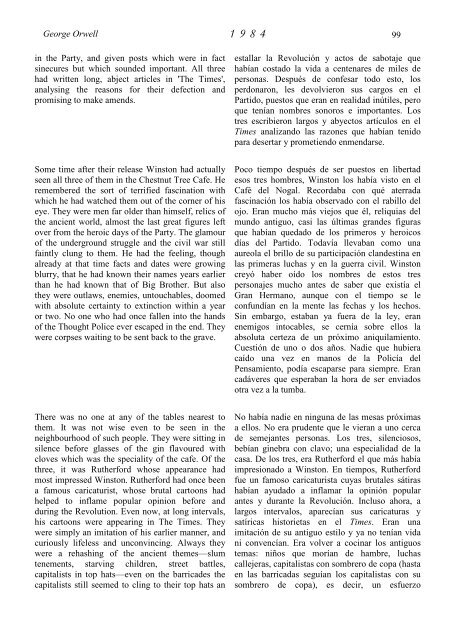Create successful ePaper yourself
Turn your PDF publications into a flip-book with our unique Google optimized e-Paper software.
George Orwell 1 9 8 4<br />
in the Party, and given posts which were in fact<br />
sinecures but which sounded important. All three<br />
had written long, abject articles in 'The Times',<br />
analysing the reasons for their defection and<br />
promising to make amends.<br />
Some time after their release Winston had actually<br />
seen all three of them in the Chestnut Tree Cafe. He<br />
remembered the sort of terrified fascination with<br />
which he had watched them out of the corner of his<br />
eye. They were men far older than himself, relics of<br />
the ancient world, almost the last great figures left<br />
over from the heroic days of the Party. The glamour<br />
of the underground struggle and the civil war still<br />
faintly clung to them. He had the feeling, though<br />
already at that time facts and dates were growing<br />
blurry, that he had known their names years earlier<br />
than he had known that of Big Brother. But also<br />
they were outlaws, enemies, untouchables, doomed<br />
with absolute certainty to extinction within a year<br />
or two. No one who had once fallen into the hands<br />
of the Thought Police ever escaped in the end. They<br />
were corpses waiting to be sent back to the grave.<br />
There was no one at any of the tables nearest to<br />
them. It was not wise even to be seen in the<br />
neighbourhood of such people. They were sitting in<br />
silence before glasses of the gin flavoured with<br />
cloves which was the speciality of the cafe. Of the<br />
three, it was Rutherford whose appearance had<br />
most impressed Winston. Rutherford had once been<br />
a famous caricaturist, whose brutal cartoons had<br />
helped to inflame popular opinion before and<br />
during the Revolution. Even now, at long intervals,<br />
his cartoons were appearing in The Times. They<br />
were simply an imitation of his earlier manner, and<br />
curiously lifeless and unconvincing. Always they<br />
were a rehashing of the ancient themes—slum<br />
tenements, starving children, street battles,<br />
capitalists in top hats—even on the barricades the<br />
capitalists still seemed to cling to their top hats an<br />
estallar la Revolución y actos de sabotaje que<br />
habían costado la vida a centenares de miles de<br />
personas. Después de confesar todo esto, los<br />
perdonaron, les devolvieron sus cargos en el<br />
Partido, puestos que eran en realidad inútiles, pero<br />
que tenían nombres sonoros e importantes. Los<br />
tres escribieron largos y abyectos artículos en el<br />
Times analizando las razones que habían tenido<br />
para desertar y prometiendo enmendarse.<br />
Poco tiempo después de ser puestos en libertad<br />
esos tres hombres, Winston los había visto en el<br />
Café del Nogal. Recordaba con qué aterrada<br />
fascinación los había observado con el rabillo del<br />
ojo. Eran mucho más viejos que él, reliquias del<br />
mundo antiguo, casi las últimas grandes figuras<br />
que habían quedado de los primeros y heroicos<br />
días del Partido. Todavía llevaban como una<br />
aureola el brillo de su participación clandestina en<br />
las primeras luchas y en la guerra civil. Winston<br />
creyó haber oído los nombres de estos tres<br />
personajes mucho antes de saber que existía el<br />
Gran Hermano, aunque con el tiempo se le<br />
confundían en la mente las fechas y los hechos.<br />
Sin embargo, estaban ya fuera de la ley, eran<br />
enemigos intocables, se cernía sobre ellos la<br />
absoluta certeza de un próximo aniquilamiento.<br />
Cuestión de uno o dos años. Nadie que hubiera<br />
caído una vez en manos de la Policía del<br />
Pensamiento, podía escaparse para siempre. Eran<br />
cadáveres que esperaban la hora de ser enviados<br />
otra vez a la tumba.<br />
No había nadie en ninguna de las mesas próximas<br />
a ellos. No era prudente que le vieran a uno cerca<br />
de semejantes personas. Los tres, silenciosos,<br />
bebían ginebra con clavo; una especialidad de la<br />
casa. De los tres, era Rutherford el que más había<br />
impresionado a Winston. En tiempos, Rutherford<br />
fue un famoso caricaturista cuyas brutales sátiras<br />
habían ayudado a inflamar la opinión popular<br />
antes y durante la Revolución. Incluso ahora, a<br />
largos intervalos, aparecían sus caricaturas y<br />
satíricas historietas en el Times. Eran una<br />
imitación de su antiguo estilo y ya no tenían vida<br />
ni convencían. Era volver a cocinar los antiguos<br />
temas: niños que morían de hambre, luchas<br />
callejeras, capitalistas con sombrero de copa (hasta<br />
en las barricadas seguían los capitalistas con su<br />
sombrero de copa), es decir, un esfuerzo<br />
99


